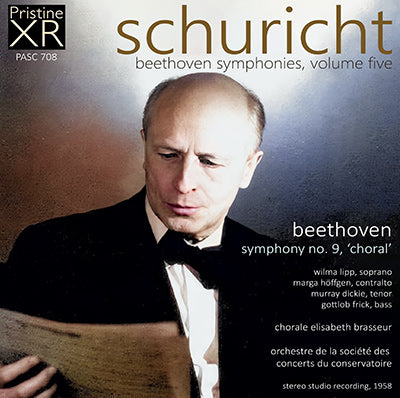
This album is included in the following sets:
This set contains the following albums:
- Producer's Note
- Full Track Listing
- Cover Art
Originally released in its mono version only, both in France and the UK - with a different, swifter recording of the opening movement (heard on Volume 4 of this series) - here we present the full, very wide stereo version of Schuricht's Beethoven 9, XR remastered in dramatic style. We managed to find two historic reviews of the release - first this, of the original mono LPs:
"This is a hearty performance of the 9th, in speeds alone and apart from its general conception. Put on a few bars of Klemperer conducting the first movement after hearing Schuricht and he seems an old tortoise; but what he gets out of it and the experience he makes it for the listener is plain if you go all the way with him. Schuricht’s performance does sound as if he is doing it on the B.B.C’s Home Service and must get it finished before the 9 o’clock News. [n.b. this refers to the faster, mono take]
The slow movement begins with strings that are nothing like mezza voce and when, later, they run into semiquavers, their line is most unusually emphatic. The whole movement lacks inward feeling and it utterly failed to move this listener.
As you would expect, the scherzo and finale come off far more successfully and the former is very deftly played. (The repeat of its second part is omitted, as often, and the orchestration is emended at bars 93 and 330 onwards, horns being turned over to the woodwind theme). The finale is good indeed, with an impressive team of soloists and a chorus that sings with energy and attack. And one point that immediately puts me on Schuricht’s side, the main theme is started at a real allegro right away.
But whatever one may find to commend, the conductor’s idea of the first and slow movements fails so greatly to give the experience we know this music can give that the performance as a whole cannot be recommended—and this, by the way, in spite of a very good recording indeed. And in spite, of a really first-class perfor¬mance of the 5th Symphony thrown in.
The discs are issued in H.M.V’s Concert Classics series and are very inexpensive. There is no doubt that if you care more about good sound than the expression of the music, this cheap 2-disc version is better than the 1-disc issues available. And for all I know, you may find the performance bracing!"
- T.H., The Gramophone, December 1959 (mono HMV LP release, c/w Symphony No. 5)
This second review of a stereo reissue dates from some 48 years later, when it appeared in Fanfare magazine:
"Schuricht’s interpretation is lively without usually feeling rushed, a matter of tempos on the quick side of standard, and firmly established rhythms from which he doesn’t greatly deviate. Attacks are sharp and contrapuntal lines, well-defined, notably so in the first movement. The Scherzo is especially successful, with the French horns, which simply don’t blend into the orchestral mix, making a virtue of their aggressively distinctive sound. Some other interesting touches include a rattenuto right before he cuts loose with the theme under full percussion barrage at 3:40; and a delightfully scampering trio.
The slow movement will not please those looking for “heavenly length.” I find it too lacking in atmosphere and span, given the long-breathed melodic lines that Beethoven spins so very well. The finale is similar in this respect, but Schuricht’s jaunty, incisive rhythms and quick tempos are better suited to the material. Frick’s entrance is nothing short of majestic, with his exemplary breath control, legato singing and enunciation. Dickie is slightly nasal, but there’s a nice bloom to his vibrato, and both Lipp and Höngen [sic] are strong. The Elisabeth Brasseur Chorale is splendid, and the entire effect by the conclusion is almost operatic in its joyful, maintained intensity.
The orchestra is not without obvious flaws, though. Poor blending between the sections, bad enough in itself, also means that bobbles are more obvious when they occur, and they occur more often than one could wish, despite some otherwise virtuosic playing. If there was time set aside for a touchup session on the four days in which this Ninth was recorded, it was unsuccessful in the main. Still, drive, focus, and clarity are there, in spades."
- Barry Brenesal, Fanfare magazine, Sept/Oct 2007 (Testament CD)
SCHURICHT Beethoven Symphonies Volume Five
BEETHOVEN Symphony No. 9 in D minor, Op. 125, 'Choral'
1. 1st mvt. - Allegro ma non troppo, un poco maestoso (15:51)
2. 2nd mvt. - Scherzo. Molto vivace - Presto (11:18)
3. 3rd mvt. - Adagio molto e cantabile (16:15)
4. 4th mvt. - Presto - Allegro (22:27)
Recorded 27-29 & 31 May, 1958
Wilma Lipp, soprano
Marga Höffgen, contralto
Murray Dickie, tenor
Gottlob Frick, bass
Chorale Elisabeth Brasseur
Orchestre de la Société des Concerts du Conservatoire
conducted by Carl Schuricht
XR Remastered by Andrew Rose
Cover artwork based on a photograph of Carl Schuricht
Recorded at Salle Wagram, Paris
Producer: Victor Olof
Engineer: Paul Vavasseur
Total duration: 65:51

